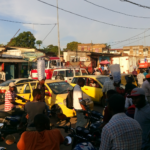Israel and the WMD-free zone: Has Israel closed the door?
By Emily B. Landau, Shimon Stein | September 27, 2012
Last week, Israel’s influential paper, Haaretz, led its front page with a rather decisive headline: “Israel rejects US-backed Arab plan for conference on nuclear-free Mideast.” The problem, however, is that the country announced no such decision.
The headline appeared the morning after Israeli nuclear chief Shaul Chorev delivered a cutting speech to the International Atomic Energy Agency’s general conference in Vienna. So far, Israel has not officially closed the door on the 2012 Middle East WMD-Free Zone Conference, which is still on the agenda for December in Helsinki. However, as Chorev articulated, Israel’s attendance cannot be assured either.
The Israel Atomic Energy Commission head certainly used some choice, sharp words about what can and cannot work in moving forward with a WMD-free zone: “Any initiative to promote the 2012 conference on the Middle East — under the banner of the [Non-Proliferation Treaty Review Conference] or the general conference of the IAEA — in complete disregard to the present regional somber realities, is futile.”
Directly preceding this remark, Chorev provided some insight into his thinking on these “somber realities” and geopolitical changes, which were dominated, in his view, by adverse developments in Iran and Syria. He highlighted the clandestine pursuit of nuclear weapons and other weapons of mass destruction in both states, their violations, as well as the fact that these deceptive activities are proceeding unabated, with the international community powerless to stop them. Syria, for one, is known to have one of the world’s largest and most advanced chemical weapons programs (and could possibly have offensive biological weapons); in his speech, Chorev pointed out that this stockpile — which the Assad regime recently threatened to use — stands in direct contradiction to a report submitted to the UN in late 2005, in which Syria stated that it “neither possesses nor intends to acquire weapons of mass destruction.”
The “acute deficit created for decades by [the] non-compliance, proliferation, violence, and terrorism practiced by [despotic] regimes [in the Middle East],” he emphasized, cannot be ignored. While Israel did not make a dramatic announcement on its attendance to the 2012 conference, the statements that were made provide an opportunity to assess prevalent and evolving trends in Israeli thinking on the idea of a WMD-free zone.
The triggers. Israel’s overall position on arms control relating to WMD has two outstanding features. First, Israel has traditionally favored a regional approach to arms control over the global approach, whereby states join broad international disarmament treaties on an individual basis. A primary reason is that states have cheated on their commitments to the global treaties, and when considering the NPT, many of the violators have been states in the Middle East. The problem is compounded when one considers the very poor record of the international community as far as confronting these violations — and the cases of Iran, Syria, and North Korea stand out prominently in this regard.
The second important feature is that when contemplating regional arms control, Israel advocates a gradual process that must begin by addressing tensions, threats, and conflicts in the Middle East. Israel supports a regional arms control process in which states communicate with one another, and build a significant basis of confidence and mutual trust before addressing capabilities. This is not a dialogue that can take place in an atmosphere of extreme animosity and rejection. And this has been Israel’s position since the 1980s, when it supported a nuclear weapon-free zone in the Middle East, and the 1990s, when it signed on to the short-lived Arms Control and Regional Security Working Group, a process that began by building confidence through various measures. Israel has — and continues to be — wary of finding itself in a process in which dynamics proceed too quickly to a discussion of capabilities, without first establishing an improved regional atmosphere and peace agreements.
Deal breakers. It is well known that Israel rejected the way that the WMD-free zone conference idea came onto the agenda in 2010, embedded in the final document at the NPT review conference; the document refers back to the 1995 Resolution on the Middle East, which called on Israel to accede to the NPT, and address first and foremost the nuclear issue. Israel, which is not a state party to the NPT, strongly disapproves of a regional discussion of WMD — which include nuclear, chemical, and biological weapons and means of delivery — being included on the agenda of a global nuclear disarmament treaty.
Moreover, Israel deplored the political agendas that overshadowed the 2010 NPT Review Conference and allowed for Israel to be singled out by name, whereas Iran, which had been found in non-compliance with its safeguard obligations, was not named because it threatened to block consensus on the document if it was. The fact that all other members of the NPT found this acceptable was highly disconcerting. Though the Obama administration later communicated significant assurances to Israel with regard to its strategic deterrence, Israel — due to Obama’s own expressed commitment to a nuclear disarmament agenda — still has questions whether it might face new pressure from the administration down the line. On an additional point, but unrelated to the 2010 review conference, Israel also has reservations about the double standard that it regards the United States has established with India. Beginning with George W. Bush, and continued by Obama, India is allowed to engage in civilian nuclear cooperation with nuclear states even though, like Israel, it remains outside the NPT.
Convening the 2012 Middle East WMD-Free Zone Conference under the direct auspices of the NPT could well be a deal breaker as far as Israel’s participation.
A fresh look. More than anything, Chorev’s remarks emphasize what Israel sees as the incongruence between the current regional realities in the Middle East and discussion of a WMD-free zone. But the question is whether expression of strong concern spells rejection, or whether Israel is still hoping to influence how this regional conference is being envisioned and planned. Israel will certainly not agree to take part in a process if it feels that it is being isolated and pressured — nor will it agree to discuss weapons capabilities and ignore the regional realities. It could be that the true message is that these realities simply cannot sustain such a process.
In this atmosphere, perhaps the time has come to start considering a more far-reaching and radical approach that would involve rethinking the entire framework for WMD arms control in the Middle East. It would necessitate removing some long-held masks and looking at the regional situation in a very direct and serious manner, and especially coming to terms with the fact that the stark asymmetries in the Middle East cannot support the underlying norms of equality embedded in the WMD-free zone way of thinking.
While asymmetries in weapons capabilities are regularly discussed, the fundamental disproportionateness in basic security concerns are not. Israel faces existential threats on a regular basis and in a manner that no other state in the region experiences. In the nuclear realm, Israel has a strong ongoing record of deterrence and non-issuance of public threats — other states, however, are looking to enhance their regional influence and hegemony, using aggressive rhetoric that rejects and threatens Israel’s existence in the region. When it comes to weapons of mass destruction, the culture of blatant deceit is prevalent in states across the Middle East and adds to the security asymmetry.
Israel still might participate in the WMD-free zone conference later this year. But one thing seems fairly certain: Until asymmetries in the Middle East are placed squarely on the agenda, states cannot even begin considering regional security in a new and realistic manner.
Together, we make the world safer.
The Bulletin elevates expert voices above the noise. But as an independent nonprofit organization, our operations depend on the support of readers like you. Help us continue to deliver quality journalism that holds leaders accountable. Your support of our work at any level is important. In return, we promise our coverage will be understandable, influential, vigilant, solution-oriented, and fair-minded. Together we can make a difference.
Topics: Biosecurity, Nuclear Weapons, Opinion















